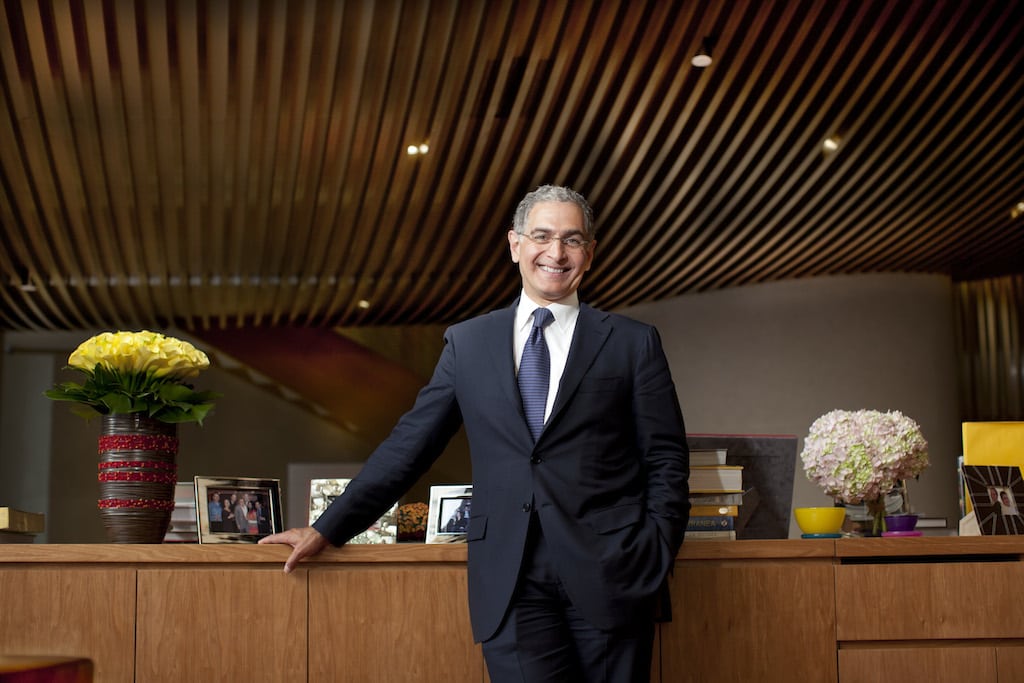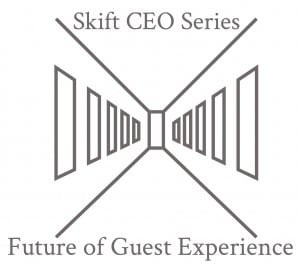Skift Take
Hoplamazian looks at the guest experience from the inside out and is more focused on internal procedures and culture that empower employees than external technology or stunts that builds buzz.
Editor’s Note: This interview is part of Skift’s CEO interview series. This particular series is with hospitality CEOs talking about the Future of the Guest Experience and the evolving expectations and demands of hotel guests. Check out all the interviews as they come out here. Also, enjoy the previous series on the Future of Travel Booking, with online travel CEOs.
Hyatt Hotels came out of the global recession with a jetpack strapped on. The hotel group had its highest expansion year on record in 2013 and entered the all-inclusive sector with with new brands Hyatt Ziva and Hyatt Zilara. It has beat earnings estimates for the last eight consecutive quarters in part due to rebounding business travel.
It’s also continued to be a leader on social media through its Twitter account, which reaches out to travelers and guests to increase engagement and brand awareness.
Skift recently spoke to Hyatt CEO Mark Hoplamazian about guests’ changing demands, why he changed employees’ on-boarding process, and how the hotel is using social media to drive engagement internally and externally.
Skift: What are some of the challenges that you’re facing to improve the guest experience today?
Mark Hoplamazian: The biggest issue is really the pace of change in terms of consumer behavior and attitudes. Frankly, it’s a great opportunity for us to take advantage of the changes and new opportunities to figure out how to engage with travelers.
For example, attitudes and behaviors have changed significantly in China around what luxury means and how people travel in just the last couple of years. The same is true in India. I could keep going around the world.
The key issue from our perspective is figuring out how to take full advantage of what we consider our most valuable asset, which is our people on the ground in each market. If you figure out a way to allow them to increasingly bring themselves to what they do and to bring their experiences and the learnings from our guests into what we do then there are huge opportunities to take advantage of to really serve our guests differently as time goes on.
We’ve been really focused on trying to promote and introduce design thinking into our hotel teams by encouraging them to really take a fresh look at everything that they are seeing every day, seeing it fresh. We have this term that we coined, or that we borrowed, actually, from the folks at Ideo called “vuja de,” which is taking a fresh look at something you see every day.
Skift: What are some of the unexpected shifts you’ve seen in guest expectations and demands?
Hoplamazian: The biggest shift that we’ve seen is the explosion of engagement on social media. Over five years ago, we were the first hotel company to utilize Twitter to engage with our guests through @HyattConcierge and we’ve learned a huge amount. It just keeps morphing and manifesting in different ways.
A couple of weeks ago, a consultant that we do a lot of work with sent me a note about how wrote about a beer app on Twitter and we ended up engaging with him and sending him another beer within moment. He thought, “This is wild. I rated the beer that I was drinking and here I am interacting with @HyattConcierge.”
I personally am engaged with our colleagues in a really different way. I’m part of a WeChat group with our general managers and our development colleagues in China so I’m keeping track of what they’re doing. They’re posting things about their everyday lives and what’s happening at their hotels so it’s really a completely different form of engagement.
One of the great things is people create new ways to engage on social media. We did a culinary competition in India a couple of weeks ago and the staff created a hashtag #cookwithhyatt, which has been amazing in terms of engagement among colleagues and among guests and people who were there for the cook-off.
The thing I love about this whole shift towards how people are engaging with one another is that it’s manifesting itself in how our colleagues are able to engage themselves, which I think is super powerful.
Skift: What role is technology playing outside of social media in improving the guest experience. Do you find yourself focusing more on consumer facing or back-end technology?
Hoplamazian: The answer is both. Technology is a great facilitator of experiences, but we don’t really think of it as the experience. It’s a really important tool for us as we think about how to bring the brand experience to life, but not as an end unto itself. A really important focus is our colleagues’ experience in hotels.
Hotel operating systems are notorious for having challenging user interfaces and not a particularly great user experience so we’re developing a new front end, basically, to simplify the interface. That’s critical for us because it allows people to spend less time looking at a screen and more time looking at our guests, engaging with them, and creating emotional experiences.
Through a lot of empathetic interviewing and real engagement with our front-line colleagues, we recently recognized that scheduling is a huge issue for people. We’re creating a mobile app that links into our hotel operating system and allows people to do scheduling on their own mobile devices.
All of these things that help to enhance our colleagues’ experience ends up impacting the experience of our guests. The technology itself is not what we’re focused on. It’s really using technology to address key consumer needs.
Skift: It sounds like making the lives of your employees easier is a focus, which is great, but I’m curious if the hiring process has changed at all over the past few years. Not just what you’re doing once they’re a part of the company, but the type of people you’re bringing in and the process that you go about to find them.
Hoplamazian: Hiring great people who can really bring our brands to life and create emotional connections with our guests is the most important thing that we can do. Hiring and on-boarding them the right way. Again, through a lot of engagement with our colleagues, we recognized that the on-boarding process that we had in place was very focused on the rules and regulations of employment at Hyatt. We completely scrapped that and have gone towards a much more values-based and culture-based approach to how we introduce people into the Hyatt family.
They didn’t join the company because we have a better set of rules and regulations. They joined because of culture and emotional connections. That’s what we lead with and what we need to continue to promote and celebrate, because that’s what will allow us to continue to hire great people.
Skift: Switching gears a bit, what are your views are on this increase in hotel fees or surcharges levied against guests.
Hoplamazian: The key, from our perspective, is transparency and clarity. It’s true that people want simplicity and they also demand transparency. We never want a guest to surprised at check-out. There are so many different models at different types of hotels for how to charge guests. There’s a lot of diversity around it.
The key issue is just making sure that people understand what they’re being charged for and how that’s going to show up on their bill because, again, you don’t want anybody to be surprised at check-out.
Skift: Andaz was one of the first of the first lifestyle brands launched by a major hotel corporation. Do you think that Andaz was ahead of its time? Has it been a role model for other hotel corporations launching lifestyle brands?
Hoplamazian: Emulation is a great form of flattery so I guess we’re being flattered. Andaz is very much a response to what we were already seeing in the marketplace. We were approached by a bunch of developers, but more importantly we went out and did a lot of direct research with travelers.
What we realized is that people absolutely want to have a vibrant and eclectic experience with respect to the design of the hotel, but also the kinds of experiences that they could have. We really built a tether into the cultural communities in the cities in which we operate. That’s become the tenant for Andaz.
We have a salon series with which we bring in local artists and expose our guests and the Andaz community at large to amazing artists and people in different artistic locations. I love the kinds of connections that we’ve been able to make.
I think that that approach to serving a very important guest base has become something that a lot of other companies have focused on. I think the reason is because it really does reflect, from an experiential perspective, a different type of travel experience.
Skift: Is there anything that we didn’t touch on that keeps you up at night about the guest experience?
Hoplamazian: The most important thing is just recognizing that the guest experience is the result of engagement with our colleagues and that the definition of powerful brands is emotional connectivity to the brand. We’ve been pushing very hard in this direction, to make sure that our colleagues can really bring who they are directly into the guest experience.
It sounds easy and obvious, maybe, but when you really start to peel that back, you recognize that you really have to end up undoing a lot of operating procedures that you may have thought were good ideas in the past. Instead of giving people a map in terms of what they’re supposed to do and make, give them a compass and say, “You figure out how you want to bring yourself to bear.” A compass instead of a map is really one of the key concepts that we are moving towards.
Bringing that guest experience to life is in the hands of our colleagues, and technology definitely enables that, but again, we have to make sure that it’s about the experience and not about the device. That’s really what we stay focused on.
Skift: Is there any risk in that, giving employees this free range, let’s say?
Hoplamazian: It’s interesting. The theory, historically, has been you really need to script people. If left alone, they make mistakes in what and how they do their job. It’s my belief that there’s much more risk in having a set of rules that you’re asking people to follow and taking the humanity out of that experience than there is in letting people be themselves.
I have an expression, which is “authenticity beats out precision every time,” and that’s a tenant that we believe in. It does require you to have great leadership at hotels to make sure that when things fall outside the lines, so to speak, that they get addressed, which is part of what being great operators is all about.
When you do that, you really are encouraging a lot of innovation and a lot of insights because our colleagues are able to actually interact with our guests and each other in a much more elemental, human way, and we’re learning so much more about what people are really looking for and what they need.
Have a confidential tip for Skift? Get in touch
Tags: ceo interviews, foge, hyatt
Photo credit: Hyatt Hotels CEO Mark Hoplamazian. Hyatt Hotels

